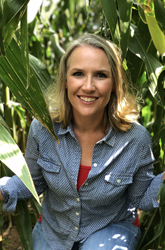
Jourdan Bell is the regional agronomist for Texas A&M AgriLife Research and Extension at Amarillo. She received her PhD in soil science from Texas A&M University and her BS and MS degrees from WTAMU in Canyon in agriculture and plant, soil, and environmental science. Prior to joining Texas A&M AgriLife in 2014, Bell worked as a research technician for the USDA-ARS at Bushland for 14 years in the Soil and Water Management Unit. With USDA-ARS, she assisted in research on manure management, soil water dynamics in dryland cropping systems, and irrigation scheduling. Her current research and extension programs evaluate and promote agronomic practices to enhance crop production and profitability under limited irrigation and dryland systems of the Texas High Plains. She is a current member of the American Society of Agronomy, the Crop Science Society, and the Soil Science Society of America. She previously served as the vice leader (2014) and leader (2015) of the American Society of Agronomy Crop Irrigation Strategies and Management Community.
Jourdan Bell is the regional agronomist for Texas A&M AgriLife Research and Extension at Amarillo. She received her PhD in soil science from Texas A&M University and her BS and MS degrees from WTAMU in Canyon in agriculture and plant, soil, and environmental science. Prior to joining Texas A&M AgriLife in 2014, Bell worked as a research technician for the USDA-ARS at Bushland for 14 years in the Soil and Water Management Unit. With USDA-ARS, she assisted in research on manure management, soil water dynamics in dryland cropping systems, and irrigation scheduling. Her current research and extension programs evaluate and promote agronomic practices to enhance crop production and profitability under limited irrigation and dryland systems of the Texas High Plains. She is a current member of the American Society of Agronomy, the Crop Science Society, and the Soil Science Society of America. She previously served as the vice leader (2014) and leader (2015) of the American Society of Agronomy Crop Irrigation Strategies and Management Community.
